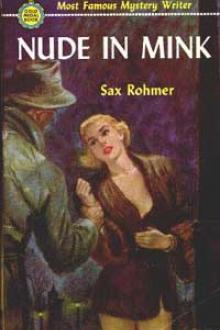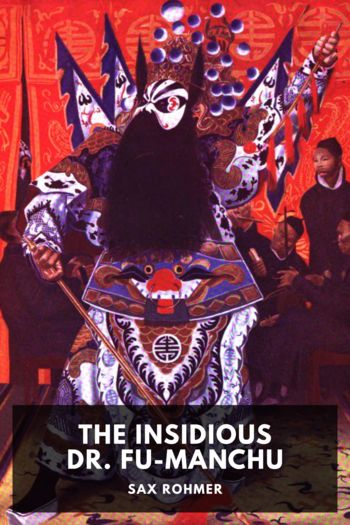Nude in Mink - Sax Rohmer (fun books to read for adults txt) 📗

- Author: Sax Rohmer
- Performer: -
Book online «Nude in Mink - Sax Rohmer (fun books to read for adults txt) 📗». Author Sax Rohmer
He glanced around interrogatively, and then continued.
“Our second is even greater. We don’t know who this woman is! No one can describe her. She is variously reputed to be the widow of a Japanese marquis and the widow of the Swedish millionaire, Baron Rikter, founder and first president of the St. Erik Ambulance Corps. She may quite conceivably be both, of course. But one of these ladies is said to be a young and singularly attractive person—namely, the Marquise Sumuru—whilst the other, Baroness Rikter, is old. When I add that the baroness has disappeared I have indicated our third, and greatest difficulty. Miss Duquesne —I appeal to you:—Are the Baroness Rikter and Sumuru one and the same person?”
Claudette looked swiftly at Mark Donovan, and then replied:
“Yes!”
There came a momentary silence, broken by Maitland.
“I can confirm this,” he said.
Colonel Stayton cleared his throat again.
“We have therefore to accept the astonishing fact that the baroness—well known and respected for her many charities—lived continually in disguise!”
“It was a simple disguise, Colonel Stayton,” Claudette interrupted composedly. “Merely a silver wig—you have seen it—but wonderfully made, slightly tinted spectacles (you have those, too) and an appearance of age.”
“But the change of voice and of facial expression was astounding,” Maitland declared. “If Sumuru were not the world’s greatest criminal, she would be the stage’s finest ornament.”
“She is not a criminal,” Claudette murmured.
This quietly confident statement created a curious impression upon her listeners. Colonel Stayton laid his reading glasses on his desk.
“Possibly I misunderstood you, Miss Duquesne. You say that a woman who had you abducted, a woman who has abducted numberless victims; a woman who has committed murder… really!”
Words failed the Assistant Commissioner. But Claudette maintained her point.
“Those she abducted were not her victims, Colonel Stayton. If they failed to see her point of view, no coercion was used—no physical coercion—”
But Donovan’s adoration could no longer silence his plain common sense.
“What about the mental coercion?” he demanded. “Why, that woman just plays on human emotions like someone playing on a harp!”
“Even if we pass that point, Claudette,” came support from Maitland, “we can hardly condone the murders of Miles Tristram and Ian Forrester!”
Claudette shook her head.
“I don’t condone them. I understand that it may be better for a few to die—however innocent—than that a great cause should be ruined. If, as she believes, the world can be brought to outlaw war, and greed, and all ugliness, nothing should be allowed to stand in the way of such a crusade.”
Donovan cast an embarrassed glance at Maitland. Ives glared uncomprehendingly.
“H’m!” Colonel Stayton, elbows resting on the desk, pressed the tips of his fingers together. “Er—I begin to realise the extraordinary influence which this woman wields. To pass on:—How did the Baroness contrive to deceive everyone in her social contacts?”
He addressed Claudette.
“She had few social contacts. She lived a retired life. She was represented, to the outside world, by a secretary—a very beautiful woman—Mrs. Chezzington-Hay.”
“This is new to me!” Maitland exclaimed. “Who is Mrs. Chezzington-Hay?”
“You know her as Sumuru!”
Ives stood up suddenly.
“What do you say? What do you say?… Pardon me, sir!”
“Certainly, Chief Inspector.” Colonel Stayton glanced aside at him. “I share your amazement. Are you telling me, Miss Duquesne, that this woman posed as her own secretary?”
Claudette nodded.
“Yes. She went everywhere for St. Erik’s—all over the world, I believe—and, naturally, had full authority from the president.”
“Naturally!” Maitland laughed. “Good God! How many other identities has Sumuru? She is not, by chance, a popular film star, or a well-known woman novelist, for instance?”
But the forced gaiety in his voice awoke no echoes amongst his audience. Claudette, alone, smiled, a little sadly.
“I don’t know, Dr. Maitland. You could hardly expect her to allow me to find out anything she didn’t want me to tell you.”
From the Assistant Commissioner’s desk came a subdued buzzing.
“Yes?” He bent to the instrument—“speaking… Very well… An urgent call for you, Dr. Maitland—”
Maitland stood up, and crossed.
“Thank you… Hullo! Steel Maitland here… Merciful heaven!”
His whole expression changed. Amazement had all but overpowered him…
“Have I surprised you, Dr. Maitland?” a musical voice inquired.
He turned to Colonel Stayton, signalling to him to listenin, and at the same time with his lips he silently framed the name: Sumuru.
“Good God!” cried Donovan.
But Claudette no more than whispered the words:
“Ah! no, no!”
Colonel Stayton, intent upon the message, said aside to Ives, in a low voice:
“Hold this call, Chief Inspector.”
Ives left the office. Donovan, Claudette, and Superintendent Mason stood studying the faces of Colonel Stayton and Steel Maitland as they listened…
“Please tell Claudette not to be frightened. She is safe in Scotland Yard. And tell Mr. Donovan, who is with you, that the little one is my parting gift to him. You might add that the beauty of woman is a double-edged sword. Let the scabbard be strong. I shall watch over their future, and hope to attend the wedding. I am giving up my presidency of St. Erik’s. The corps has served my purpose. It is now entirely free of my personal influence. Its present members are ignorant of the private use which I made of its facilities. See that they are not molested. Give my regards to Colonel Stayton. His wife is an old friend of mine. Au revoir, Dr. Maitland…”
Before Maitland, who stood nearest, could stir a hand, Colonel Stayton slumped back in his chair, his florid colour tinged with grey. Superintendent Mason sprang to his side. “What is it, sir? What is it? Are you unwell?” But the Colonel forced a smile and waved a hand reassuringly.
“Forgive me—this weakness … It will pass—”
“But, Colonel–-” Maitland began solicitously. “My wife left me—disappeared—six years ago! … I had given her up for dead.”
“Colonel Stayton! You have my deepest sympathy.” The Assistant Commissioner was rapidly regaining grip of himself.
“She went—she must have gone—to that woman!… And I searched the world for her!” He stood up, steadily. Much of his normal colour returned. “Superintendent—trace that call … If this she-devil’s in England, we’ll get her!”
2
Chief Inspector Ives was in luck in the matter of the phone call. From Scotland Yard’s private switchboard where the incoming line had been held, Whitehall Exchange traced the origin of the call. Their investigations showed it-to have come via Tamdem. From this centre, inquiries were directed yet further afield, and, a few minutes later, a Hertford operator reported that it was made from a call-box on the Great North Road.
All police cars in the district and all police cyclists were interrogated. It was a cyclist who provided the first clue…
Sumuru had actually been in the call box when he passed. The man was still in sight when she came out. Philo, wearing a blue livery, awaited her beside an inconspicuous American car which, in fact, was super-engined.
Sumuru wore a smart tweed suit beneath a mink cape. Few people acquainted with My Lady—or with Baroness Rikter—would have recognised this dark-browed, open-air woman who looked as though she spent much of her time in the saddle.
“My Lady!” Philo was agitated. “A police cyclist passed while you were talking!… We must hurry.”
My Lady settled herself in the front seat beside her dangerous-looking chauffeur. Philo moved off at a speed which betrayed the secret engine.
“You would rob me of my sport, Philo. I love to give the hounds a run! Now, already, they will be in full cry. My wits against Scotland Yard—and the Secret Service. How easily I could have vanished—like a mirage, and left no trace. How undramatic to do so! We shall be reported back to London from every town through which we pass—”
“And sooner or later—stopped,” Philo added.
Sumuru laughed gaily. Her laughter resembled a peal of fairy bells.
“We should be, if we ran straight, Philo. But here is an old and wary fox. We shall confuse the hounds… Ah! this is life!”
3
Many lines vibrated with urgent voices…
“Superintendent Dimes, speaking from Hertford… Yes, sir… the call was undoubtedly made from a call-box on the Great North Road…. All cars are being stopped and examined, sir…. Yes, one of my men reports passing a stationary car near a box at that time…. Very good, sir…”
“All drivers being interrogated entering St. Albans from the south, sir. All available cars and cycle patrols are spread out to intercept “
“The car is almost certainly a Buick, sir. Chauffeur driven. One lady passenger. It is reported as having passed through Hatfield ten minutes ago…
“Looks as though they are doubling, sir. I have just had a report from Lower Porlock. A car answering to description—one woman passenger—went through the village at racing speed. A constable signalled the driver to stop, but was ignored, nearly run down…”
“NOTHING more come through, Thomson, since the report from Porlock?”
“No, sir. Radio’s dead.”
The police car began to slow down.
“This is Lower Porlock ahead, now,” said Ives.
“And mist is rapidly developing into fog, Ives?” Maitland added ruefully—“Ah! there’s a patrol! Stop, Thomson!”
With a ghoulish shrieking of brakes, the car was pulled up almost beside a police cyclist…
“Hullo, Sergeant! What news?”
“Very little, sir, I’m afraid,” the man reported. “The Buick seems to have melted into thin air.”
“What in hell are you talking about?” Ives asked harshly. “Which way was the car coming when it was sighted?”
The police sergeant flushed confusedly.
“From the direction of Hatfield, sir. It’s quite clear they have been doubling around the district to escape us. But I was on the main road leading out of Lower Porlock, and there’s a trap at the crossroad at the other end.”
Maitland quietly took up the interrogation.
“You mean that the car came into the village, but didn’t go out?”
“Well—it looks like it!”
“That should simplify matters. Evidently, they have turned into a private drive somewhere. How many men have you within call?”
The sergeant considered this.
“Well—I could get one from the police car at the crossroads, and—”
“Get him. How many drives open on the stretch of road between your post and the crossroads?”
Again the local man paused.
“Er… One—two… There are three, sir.”
“Including the one which I can see from here?”
“Yes, sir. That’s Porlock Park, the residence of Lady Carradale.”
“Is Lady Carradale at home?” growled Ives.
“Away, I am told, sir,” was the answer. “A housekeeper in charge.”
“Right.” Ives stepped out. “Thomson, relieve the sergeant. Stand by with the car. Stop everybody. You, Sergeant, get the other man and examine the two places you mentioned—”
“And we,” said Maitland, “will call on Lady Carradale’s housekeeper.”
“Very good, sir “
The sergeant kicked his engine into sputtering life and went racing away.
2
Moisture dripped mournfully from the leaves of great elms which guarded a winding, gravelled drive. Visibility grew steadily worse.
“This is the house we want, Ives!” Maitland’s voice held a note of controlled excitement. “You may recall that we have come across Lady Carradale before? She played a mysterious part in the death of poor Ian Forrester. You remember?”
“I remember well enough!” Ives was in a particularly black mood. “But all our inquiries led us nowhere.”
He tramped on stolidly through drenching mist.
“All the same, you must have found out something about her.”
“We did. But nothing of any interest.





Comments (0)